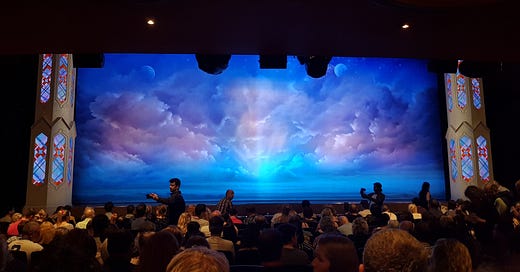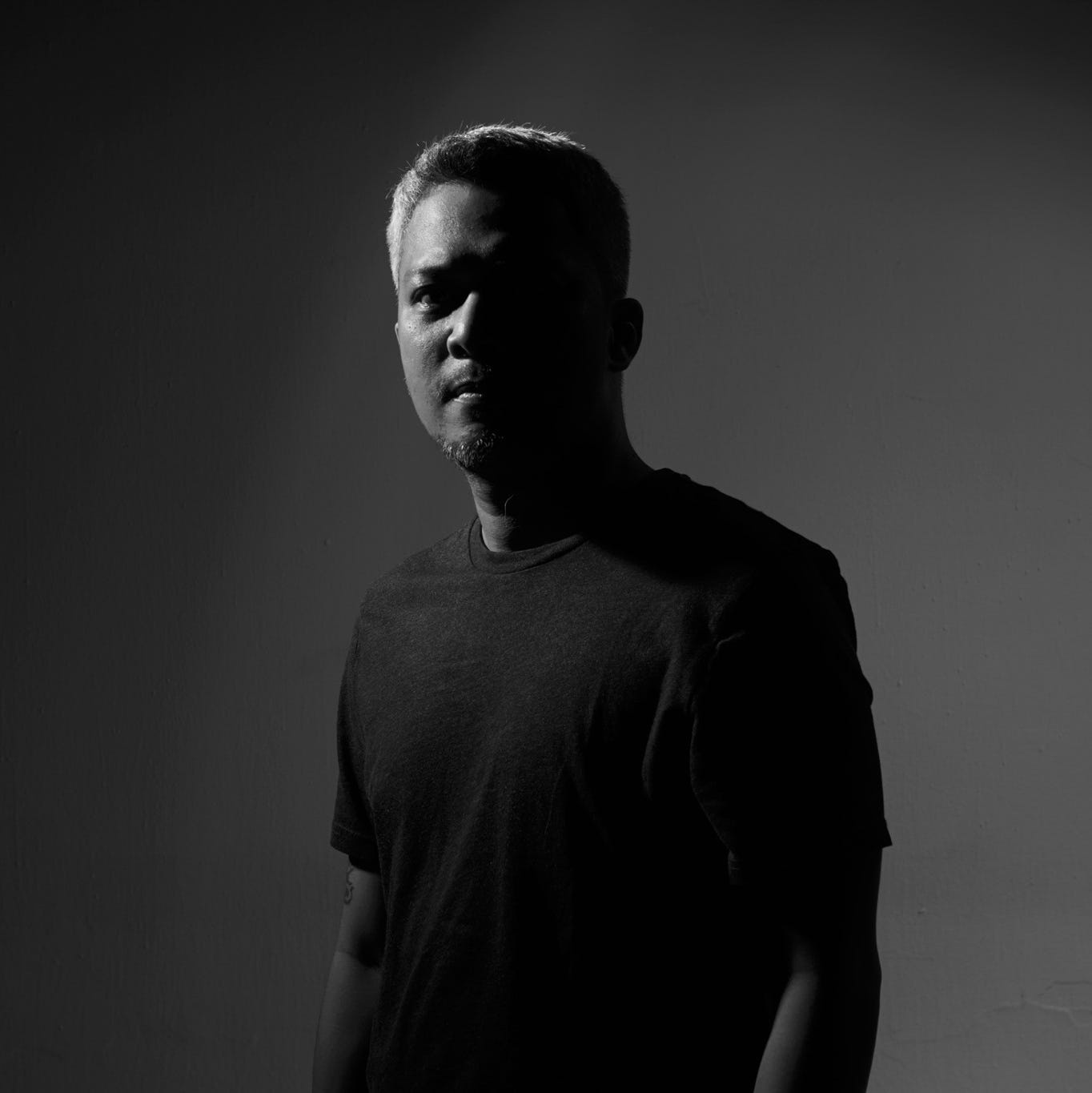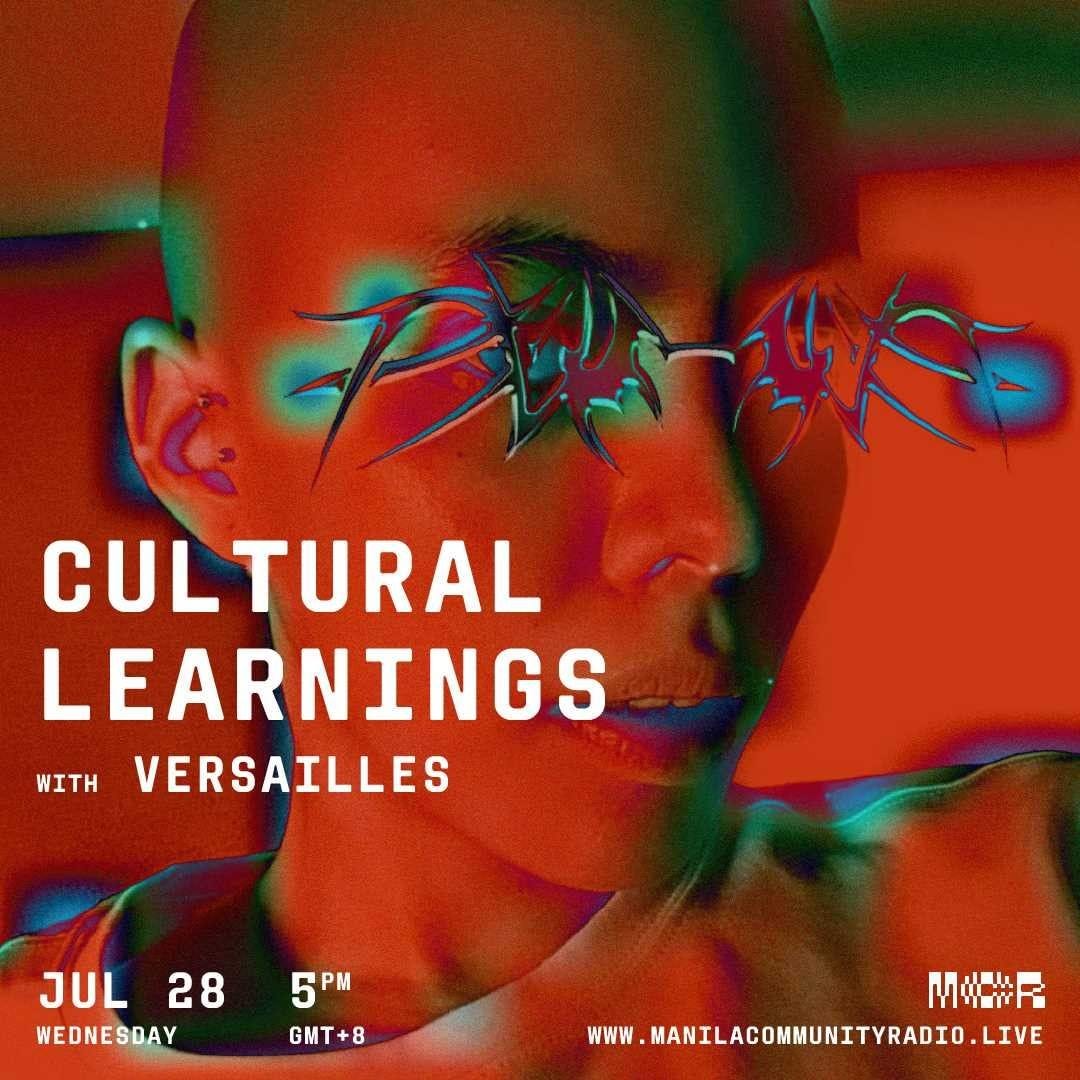How does "long Covid" affect a community?
The pandemic's effect on the communal body. Plus, dispatches from Jakarta's nightlife scene with techno heavyweight, Ecilo.
Cultural Learnings is an editorial platform for discussions on contemporary culture, curated by Sai Versailles. You can support it by subscribing to this newsletter, sharing it with your friends, emailing your thoughts, or answering this survey.
Cultural Learnings is on Manila Community Radio every Wednesday, 17:00 - 18:00 GMT+8. You can access the radio archive here.
Taking my seat to watch The Book of Mormon at the Prince of Wales Theatre, London, in June 2019.
While major cities like New York and London relish the return of nightlife, the night lives differently in most parts of the world.
In Metro Manila, normalcy briefly returned. The city’s congested streets hit the ground running. Friends, long holed up at home, celebrated their vaccinated life outside. These days, entering a restaurant comes with a newness, like visiting a friend’s home in a new part of town. My favourite listening bar is in a neighborhood at the pulse of Manila’s nightlife scene; their owners relieved to extend opening hours again, welcoming back patrons.
Ray Oldenburg believes people rely on three spaces: home, work, and a place of community – a “home away from home.” I know people who wilt to the thought of stepping foot outside, but my well-being depends on this “third space.” I speak as someone who’s lived through the pandemic, sometimes drearily, alone. “Pandemic loneliness” is a popular genre of journalism right now with 305,000 results on Google News alone. To leave your work and home is to step out from a space largely concerning you and with those who share your plight. After all, misery loves company.
I feel this sense of community most deeply beside a big sound system where people surrender their façades. Yet, parties in most parts of the world have been driven underground – imagine, if you will, a form of prohibition.
I indulged a brief taste of it two weekends ago at a speakeasy inside an office building. The night quickly turned as the DJs pumped the tempo and familiar, dimly lit, faces crowded the room. This is technically “underground,” I thought, but what a pleasant relief to see everyone here. Sure, it’s risky, but I would gladly spend my last night with this happy company.
As fear for the Delta variant loomed large, the city reinstated a tamed-down version of lockdown last Friday – colloquially known as “general community quarantine with heightened restrictions.” Simultaneously, while the northern hemisphere tilts towards the summer months, floods reached waist deep in some parts of Manila, signaling the raging monsoon season. Night spots that braved the urban grit either shut its doors or, by the fate of inevitability, had their doors shut. Among those that closed included the listening bar I frequented where rainwater dripping from the ceiling drenched the audio equipment. Normalcy dissolved, returning back to where we were.
Is this the “long Covid” we will grapple with for the months to come?
I spoke to Ecilo a few days after that night at the speakeasy. Dubbed by Jeff Mills as “Indonesia’s techno master,” he is a fixture in Jakarta’s nightlife scene, known for his signature take on the Detroit-style sound. Aside from discussing the beauty of big sound systems, pre-pandemic clubbing, and what it takes to grow a “scene”, Ecilo contributed a guest mix for the radio show, delivering an hour of hot and heavy benders.
For tomorrow’s show (Wednesday), I’m returning to my roots with my own techno selections, including tracks I might play in my own third space. Tune in on www.manilacommunityradio.live between 17:00-18:00 GMT+8.
How do you pronounce your stage name?
My real name is Reza, but people know me as a-chi-lo. My friend gave it to me a long time ago. I used to play a lot of chill-out music, and they used to say "Hey, chill-o." It's a funny story.
What got you started making music?
I started DJing in 2007 and producing music around 2011. I had no intention of becoming a DJ. But one time, I was at a friend’s place – he was mixing jazzy house and I liked it. I visited him often to learn and practice DJing. Suddenly, I’m here. That’s just it.
Have you been listening to more music during the pandemic?
For sure. I’ve been listening to jazz, like Bill Evans and John Coltrane. Classic jazz, new jazz, heavy jazz. Soundtracks. Some rock, too.
What soundtracks have you been listening to?
I'm interested in science fiction, like Metropolis, because they add interesting sound design. I also like horror soundtracks, like It Follows. Have you seen it?
By Disasterpeace! So good.
It’s a masterpiece. I have the vinyl record for that. I listen to elements from parts of tracks and recreate it in my music.
How would you describe the music you make?
I like old school techno, but I particularly like the minimal techno Jeff Mills, Robert Hood, and DVS1 brought to the game. Minimal techno is not "intelligent" music per se, but it feels deep despite having very few elements. It makes me “travel” and that’s something I really like.
I love techno and I could listen to it at home. But since the pandemic, it’s been hard to enjoy it at its full capacity because my sound system doesn’t give the music justice. I recently went to a bar with a nice sound system. But when I played techno, the higher frequencies sounded like shattering glass. It was too loud. Do you think techno is dependent on the venue?
It’s important the speakers of a sound system are prepared for the music. If you want to play good techno, you need to experience it with a big sound system. In small rooms, the low frequencies are normally tighter, which means you can’t push it to play techno.
What’s the club scene like in Jakarta?
House music in Jakarta is very big – I mean, it’s big everywhere in Asia. But in Jakarta, we have a range of different house genres, like Chicago house, micro house, Romanian house. It’s quite surprising, actually.
I would say the techno scene here began around 2014, but it’s hard to say. When I tried finding out who the “pioneers” of techno in Jakarta were, it was always the case of someone once playing techno, and suddenly they’re not. I suppose techno here hasn’t been consistent in that way.
Today, Jakarta’s techno scene is still small but it’s slowly developing. We have a group of young people here we call the “battalion” and they have a movement of sorts to make techno a proper scene. You can see a similar movement for that in Bali, too.
Is techno a generally accepted genre in Indonesia?
I think it takes time for anyone to really get into techno music because the beat is so fast. It’s easy to understand why someone’s background can lie somewhere between soul music or house. But when you listen to techno for the first time, there’s always that first reaction: “What [music] is this?” Eventually, you understand.
I can admit I used to play a lot of house, but got into techno when I started producing. It’s not that I don’t like house, but I feel more challenged when I make techno music.
What do you think is the most misunderstood thing about electronic music in Southeast Asia?
If you want the scene to grow, you have to be a part of it. The most successful cities with electronic music always had synergy between three things: clubs, DJs, and music producers. Some cities just want a good festival with international DJs, but never spotlight their local talent. Once your festival is done, what do you have left to prove? You need the track that proves time and time again, “OK, this is from my city.”
You can follow Ecilo on Instagram. His guest show is available for playback on Mixcloud.
Ecilo recommends watching films like Interstellar (his favourite), the Dark Knight trilogy, Zack Snyder’s Justice League, and A Beautiful Mind. Of course, there’s Cultural Learnings to be gained by listening to techno, such as from artists like Subterfuge and Jeff Mills.
This report on New York City’s illegal pandemic parties hit close to home.
Virgil Abloh, Louis Vuitton’s artistic director and founder of fashion label Off White, hops on the mic with Resident Advisor to discuss his multi-hyphenate practice and the debate on underground versus “overground” music.
Speaking of Resident Advisor, a mix I made for Ecilo’s media platform and label UNDERRADAR was RA’s Mix of the Day – an hour of “dubby cuts, percussion-led tunes and ambient.”
Wharton psychologist Adam Grant writes for The New York Times on how post-Covid happiness “comes in groups.”












